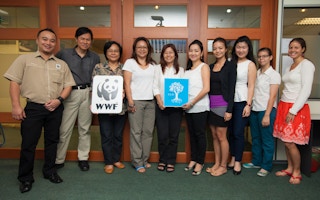The World Wide Fund (WWF) in Malaysia announced on Tuesday its partnership with the Borneo Eco Film Festival (BEFF), an annual film event that celebrates the bio-cultural diversity and local filmmaking of the world’s third largest island.
To continue reading, subscribe to Eco‑Business.
There's something for everyone. We offer a range of subscription plans.
- Access our stories and receive our Insights Weekly newsletter with the free EB Member plan.
- Unlock unlimited access to our content and archive with EB Circle.
- Publish your content with EB Premium.
The three-day, free admission event is taking place this September 27 to 29 at Kompleks JKKN in Kota Kinabalu, and it will include a special award from WWF-Malaysia this year.
According to the environmental group, this is a synergistic partnership since both entities focus on the importance of nature. BEFF highlights the natural heritage of Borneo and the community’s relationship with nature, while WWF conducts awareness campaigns and environmental programmes across the country.
Part of the organisation’s work includes the “Save the Borneo Pygmy Elephant” campaign and the Heart of Borneo programme, which is a rainforest conservation project involving the three countries sharing the island of Borneo: Malaysia, Indonesia and Brunei.
The Borneo Eco Film Festival is a purely Malaysian outfit that started in 2011. It enables an alternative type of activism for the enviroment through the visual medium. The festival is divided into three parts: the filmmaking workshops in the village and during the festival called Suara Komuniti; the Suara Publika or public talks and environmental presentations; and the Environmental Cinema session of different controversial environmental films making their Southeast Asian premiere.
For Suara Komuniti, the festival organisers work with indigenous and local communities on a one-year filmmaking programme. Trainers conduct workshops and share lessons on how to create a visual narrative, where locals can tell their own stories and experiences. This hands-on training culminates in the festival.
WWF-Malaysia, in particular, will be supporting those from the Semporna Priority Conservation Area and those from the proposed Tun Mustapha Park to participate in the workshops. Semporna consists of marine protected areas in south-eastern Sabah, on the northern section of Borneo. Tun Mustapha is also a marine area, over one million hectares across several districts that comprise of 50 islands and islets that are home to endangered sea turtles and dugongs. It will be one of the biggest marine parks in Asia, if approved.
Another highlight at the eco film festival is the Boleh Bah Filem Kita! This is a short film competition and WWF-Malaysia will give a special award for the best 10-minute video on the proposed Tun Mustapha Park. Submissions will be accepted until the end of August.
Dato’ Dr Dionysius Sharma, WWF-Malaysia executive director and chief executive officer, said, “We are pleased to support this event as their goals are very much in line with ours. The relationship between people and their natural environment has never been so vulnerable. WWF-Malaysia believes that a better future can be achieved with awareness and education, and the Borneo Eco Film Festival is an exemplary platform for this.”










